Annalise Lockhart has paid her dues – and now, the television and film assistant director, producer, and actress, best known for her work on Random Acts of Flyness, #MeToo drama The Assistant, and Chained for Life, is finally stepping into the role of director with Inheritance.
Running at a sleek 14 minutes, Inheritance tells the story of a Black American family in rural Vermont, living on land that has been in their family for almost forty years. This family, comprised of Jeffrey, the father, older brother Tucker, and younger sister Norra (Ron Brice, DeLeon Dallas, and Victoria A. Villier, respectively), are haunted by white ghosts. Ranging from the creepy to the violent, the occult horror they face is countered by Afrofuturistic hope, the scientifically fantastical that possibly promises an escape into new ways of living.
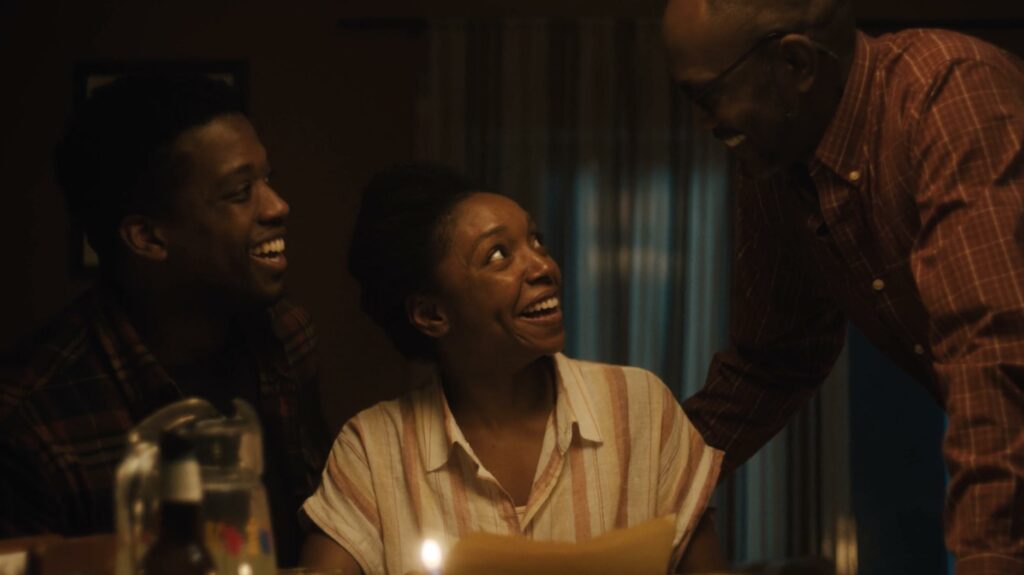
In this interview with Outtake, Lockhart discusses her time in the industry, her move to director, as well as the film’s larger connections to Afrofuturism. This interview contains spoilers.
You’ve been in the industry for over six years. What was it like to move from assistant directing and producing, to writing and directing for the first time?
Annalise Lockhart: I think it’s been a long time coming. You know, I already knew in high school that I wanted to be a director; I did a lot of theatre through college, but didn’t go to film school. My first line of attack was to work on as many sets and with as many talented directors as I could, and I viewed my time as an assistant director as my own way of going to film school. I really liked learning as much as I could about every department – it’s one of those things where you keep saying ‘yes’ to every new job. As a freelance artist especially, you really need to intentionally create that space to practice your own art. I think that I needed that confidence and that push, which was initially a little scary but felt really great. And just edifying, because I realised that I had learned so much from all those years AD-ing. It was really exciting.
I was a conductor in our marching band in college. And I remember the first day that I was on the job – I had been in the band for a while – and we were on the field playing the national anthem. And after the national anthem, the drum major blows the whistle to signal when everybody should clear off the field. But I wasn’t sure, I had been so used to waiting for the whistle. I didn’t realise that I was supposed to blow the whistle now. And then I was like, “Oh, that’s me!” And I feel like it’s that experience of like, you are around a job that you want to do. And then you realize, “I do that.” I decide when we’ve gotten a shot and move on, and we’re ready to move on.
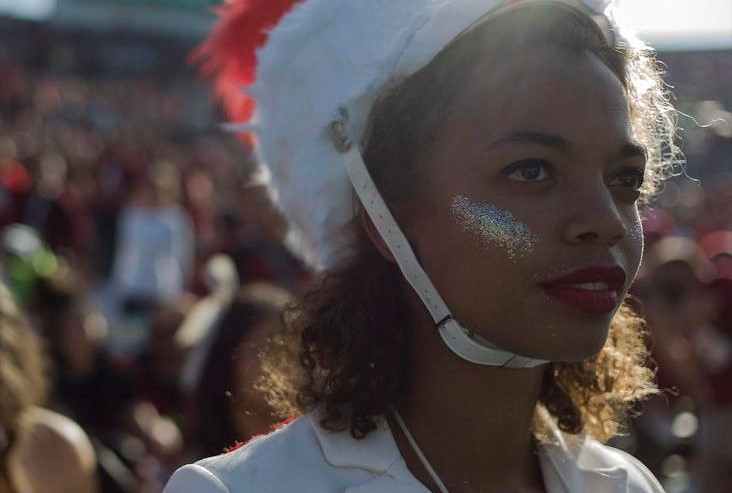
So you are the one with the whistle now, you’re calling the shots. How does it feel shifting to that role?
Annalise Lockhart: Many of us have a voice inside that has really strong opinions about the way something should look, the way a costume should look, the way a set should look. And I think that it’s like training that inner voice to make itself known and have the knowledge that your opinions are super valid, and they’re actually the most important opinions on set. And I think initially, there’s a little bit of a learning curve – I should say if something isn’t working, and I want to make an adjustment or a change, and I think that that can also be really hard. For women in these department head situations, whether it’s director or production designer, we’re conditioned from such a young age to not be “difficult.” I actually have female friends of mine who are directors and department heads, who say that “difficult” really just means a woman artist stating her opinion, and being discerning.
“Discerning” is also perfect word to describe Inheritance. What was the inspiration for this film, the plot, and the approach you took?
Annalise Lockhart: The earliest seed was that I was talking about how I liked camping, and how there was the stereotype that Black people don’t camp. And talking to friends who do it about how it’s not uncommon to get side-eyed glances and feel like, “do I fit in here?”. And so I thought, how cool would it be if there were a campsite that you could go into and in which you became invisible? Then you could really have that peace and tranquillity in nature. Also, the house that we filmed at is my family’s house in Vermont, that I spent summers in as a kid. Weaving those two stories together, like my love of the house as a sanctuary and holding all those memories – and then also, what would get in the way of that? How stereotypes from the public, urban world find their way into the natural world.
And in terms of your use of white ghosts, how did that design and their construction come about?
Annalise Lockhart: I wanted to construct them with the idea that their power came from just from them watching, like the power of their gaze was enough to have all these deleterious effects on the family. And I think that because their power is in their gaze, that when they do take the family deed, interacting physically in the family’s space is something they’d never done before. And for the dad, that was a turning point – it was enough.
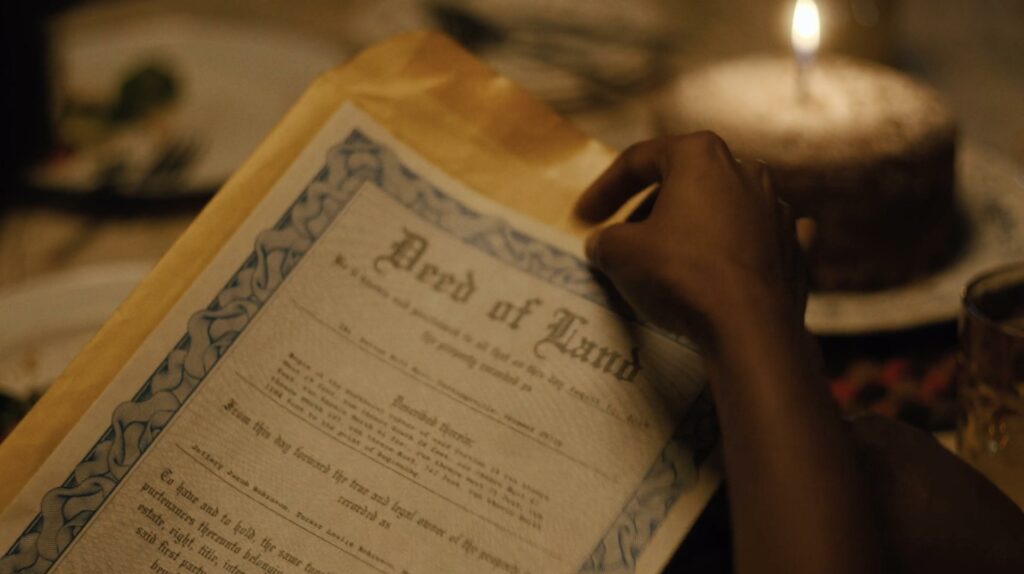
Where did Jeffrey’s character come from?
Annalise Lockhart: He’s definitely a facsimile of my dad. I have three older brothers – Tucker is definitely, very specifically inspired by one of them. I don’t know where Jeffrey came from, exactly. He so clearly fits into the world he’s in and he’s just this quiet, contemplative man. I love that monologue, too, and I love what Ron Brice did with it. He really sunk into the character, because Ron the actor is very different.
And there were definitely moments in the script where he was like, “I want to be bigger. After the deed is burned, I wouldn’t say please, I would be really rude and yell a lot.” But later, he sunk in and understood the character a little bit more, because I explained to him that, you know, Jeffrey bought the house in ’83. He’s been dealing with this for decades. I’m sure there were moments earlier in his life where his fiery spirit was more present, but it’s not right now. He’s gone through it, and this is where he’s settled.
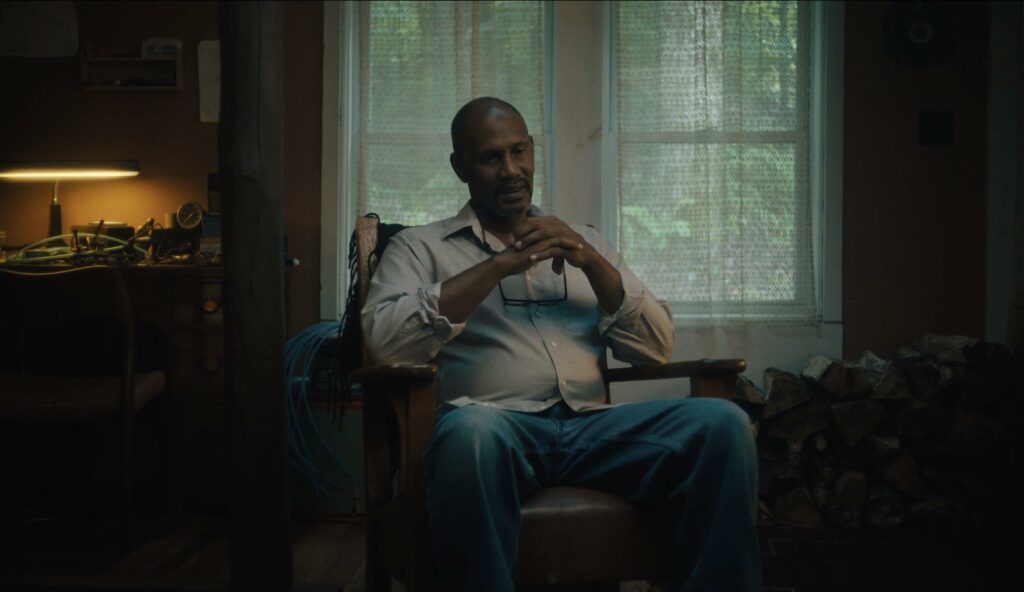
Inheritance clearly draws from Afrofuturist inspirations and legacies. Where do you see yourself in Afrofuturism? And who are some of the people you’re inspired by?
Annalise Lockhart: I feel honoured to be in the legacy of some of my favourite authors and filmmakers. I love Octavia Butler, I think she’s a huge influence, especially in the way that a lot of her work can feel really unsettled in the end. Her work always asks a question. And that’s my favourite thing about the best science fiction works, that nothing is ever simple. Samuel R. Delany is another person that I draw a lot of inspiration from; I actually wrote my thesis about him in college. Science fiction as a genre, I think, from its inception has been about solutions to really difficult problems in the modern era. I think about the quest for freedom and equality that African diasporic peoples have been on for so long. The best Afrofuturist works are looking for different visions of what the future could be like, outside of predominantly white or Western ideas of ‘the future’. And it’s really important to think about radically different visions separate from that.
At the end of the film, Norra and her family have crafted the McCoy field [an area that renders them invisible]. Norra looks at the white ghosts, and there’s this expression in her face right before she walks into the field – I saw that as her being able to transcend, leaving behind white ideas of perceptibility. They’re leaving those gazes that make them feel wrong and out of place. There’s a real sense of euphoria to it.
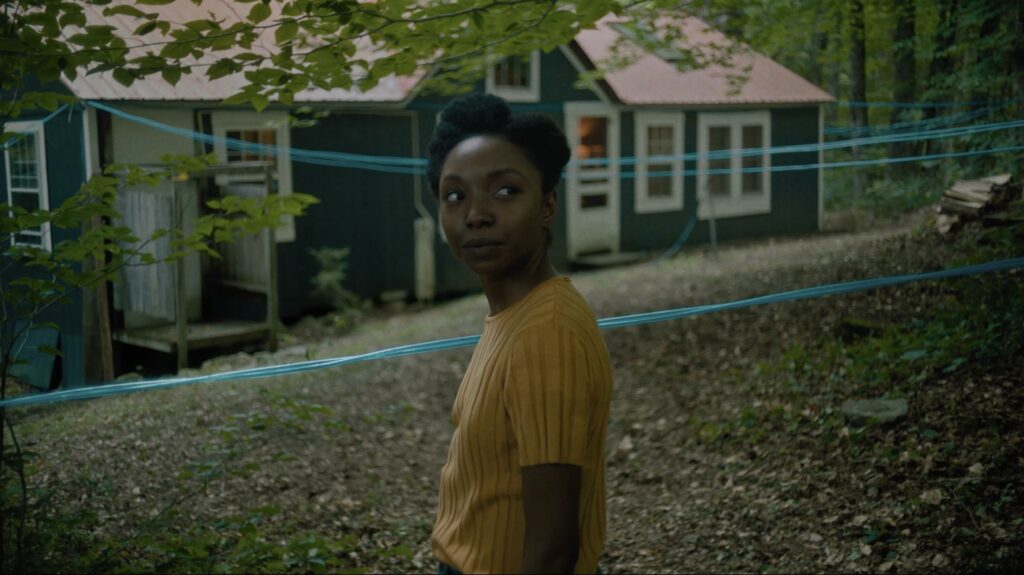
Annalise Lockhart: I love that little smirk she gives them. I love that they’re leaving the world of perceptibility and entering their own world. And I think that it’s also cool that the audience loses access to them, too. Once they once they go into the field, they disappear to us also.
What are is the McCoy field exactly, and where did it come from?
Annalise Lockhart: Tucker uses the maple tapping lines to create the force field; he’s tapping into the electricity and energy that the trees are giving off. I did do a little bit of research about certain military inventions that have been attempted as cloaking devices. But the more I wrote about it, and the more I tried to explain what it could be, the more questions it brought up. So, the solution became, “I’m going to create this term as a signal to the audience that, you’re probably not going to know what this is, but the characters know what it is and are excited about it.” The name comes from Elijah McCoy, who was a Black inventor and engineer in the late 19th, early 20th century. I loved the idea that Tucker was part of this legacy of Black inventors.
I love that the way in which the characters harness the McCoy field also involves taking back the right to being in Vermont, with maple trees being a staple of their production economy.
Annalise Lockhart: If you are familiar with Vermont, or New Hampshire, Maine, all of New England, having maple lines is very natural; it makes a lot of sense and blends into the surroundings. I think it’s also interesting to think about how Vermont does have a very progressive image, and for good reason. Bernie Sanders is from Vermont, and Ben and Jerry’s and all of these progressive movements and people, which is great and makes the state mostly very accepting.
And yet, the ghosts do stare at them. And I think that just because Vermont’s present is so progressive doesn’t mean that the colonial history of that area doesn’t exist. And it doesn’t go away. The ghosts are just these ambassadors for the earliest colonisers of the area. I think that New England – the whole East Coast – is so old, there’s so much history and so much potential haunting in that area.
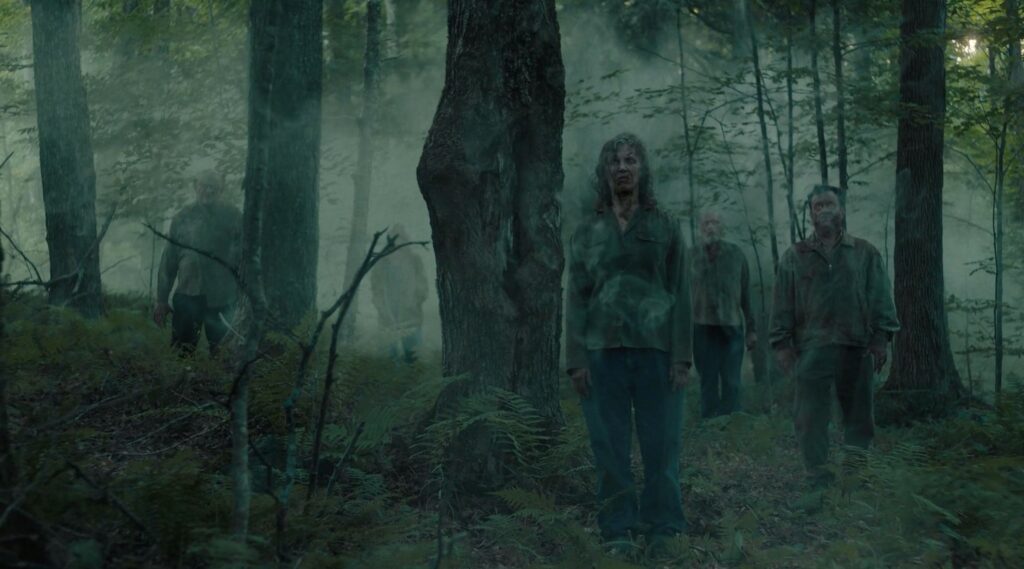
Do you foresee yourself dabbling further in ghosts? Do you have any other Afrofuturist or surrealist work coming up?
Annalise Lockhart: I don’t think I’m done with ghosts. The next thing I do is going to be this feature I’m writing and developing right now, which is more solidly science fiction and doesn’t deal with the occult as much. But I’m definitely still interested in it! And I have a story about ghosts: my aunt actually wrote a novel about her experiences seeing spirits in New Jersey so, hopefully some time down the line, I’ll be able to do something with that book. For now though, the feature is science fiction. It’s not a feature-length version of Inheritance, but it does deal with similar concepts. I’m thinking that the Black Utopia has already been achieved… And what do we do then? It sounds a little pessimistic, like, “well, what problems do we have after everything’s perfect?”. But that’s coming up.
At the end of our interview, Lockhart also expressed her great thanks to the cast and crew of Inheritance for their work on the film.
Inheritance recently won Best U.S. Short film at the Palm Springs International ShortFest, making it the short film to watch this Oscars season.
